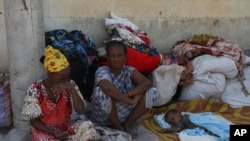The leader of Ethiopia's northern Tigray region confirmed Sunday that his forces fired missiles at Eritrea's capital, Asmara, and threatened more attacks, saying “we will take any legitimate military target and we will fire.''
Tigray regional President Debretsion Gebremichael did not say how many missiles were fired at Asmara on Saturday, but said it was the only Eritrean city targeted.
His statement confirms a significant escalation of the conflict between the two African neighbors as the fighting in Tigray has already spilled across the border.
Three rockets were fired Saturday at Asmara, according to diplomatic sources, hours after the leaders of Ethiopia’s Tigray region warned it might attack.
The rockets appeared to be aimed at the capital’s airport. Information about damage or deaths was not available.
The United States condemned what it called “unjustifiable” violence Sunday.
“We continue to urge immediate action to protect civilians, deescalate tensions, and restore peace,” Tibor Nagy, assistant secretary for African affairs at the U.S. State Department, wrote on Twitter.
On Tuesday, the regional president, who is also the leader of the Tigray People's Liberation Front (TPLF), accused Eritrea of sending troops across the border in support of Ethiopian government forces, a claim that Eritrea's Foreign Minister Osman Saleh Mohammed denied.
Eritrea has long been at odds with the TPLF, experts said, and they fear it could be drawn into the conflict between the TPLF and Ethiopia’s federal government.
Late Friday, Tigray fired rockets at two airports in the nearby Amhara region, the Ethiopian and Tigray regional governments said.
In a statement on Tigray TV, the Tigray regional government said attacks would continue “unless the attacks against us stop.”
The federal government confirmed the attacks, saying in a statement, “A rocket was fired towards Bahir Dar & Gondar cities. As a result, the airport areas have sustained damages.”
The Ethiopian army has been battling local forces in the neighboring northern Tigray region for more than a week.
Hundreds have been killed since Prime Minister Abiy Ahmed sent the national defense force into Tigray November 4, after accusing local forces there of attacking a military base.
More than 14,500 Ethiopians have fled to Sudan and the U.N. refugee agency says more people are on their way.
On Friday, U.N. High Commissioner for Human Rights Michelle Bachelet expressed alarm at the rapidly deteriorating situation in Tigray.
Her spokesman, Rupert Colville, said Bachelet was particularly disturbed by an Amnesty International report of alleged mass killings in the town of Mai-Kadra in southwest Tigray.
Amnesty said photographs and videos of the scene indicate hundreds of people were stabbed or hacked to death. It says the victims appeared to have been day laborers, who were not involved in military operations.
The Tigray People’s Liberation Front has denied that scores or hundreds of people had been “hacked to death” in Mai-Kadra.
Colville said the high commissioner was fearful of the consequences if Tigray and Ethiopia fail to heed her warning.
If fighting continues, he said, Bachelet feared the conflict could easily spill across borders, potentially destabilizing parts of East Africa.





